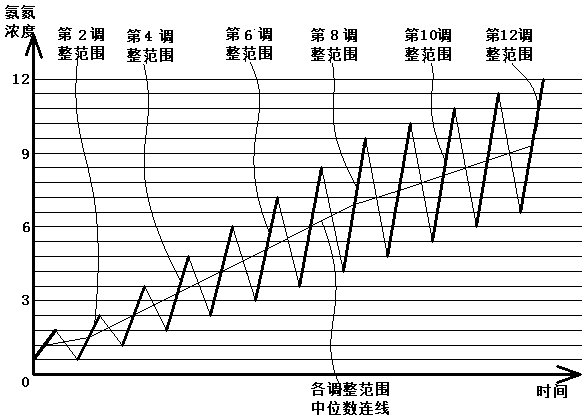Cultivation method for novel ammonia-nitrogen resistant variety of giant tiger shrimps
A technology of penaeus monodon and cultivation method, applied in fish farming, application, climate change adaptation, etc., can solve the problems of death, increase of blood ammonia content, decrease of hemolymph protein and hemocyanin concentration, etc., to ensure timeliness , strong universality, optimized screening effect
- Summary
- Abstract
- Description
- Claims
- Application Information
AI Technical Summary
Problems solved by technology
Method used
Image
Examples
Embodiment Construction
[0028] The present invention will now be further described in detail in conjunction with the accompanying drawings and embodiments. These drawings are all simplified schematic diagrams, only illustrating the basic structure of the present invention in a schematic manner, so it only shows the composition related to the present invention.
[0029] like figure 1 As shown, a method for cultivating new varieties of Penaeus monodon resistant to ammonia nitrogen, the ammonia nitrogen concentration in the culture water body is divided into several gradient ranges, and the median of the ammonia nitrogen concentration in each gradient range is from low to high in order from the first adjustment range to the second 12 adjustment range. By using several step ranges to adjust the ammonia nitrogen concentration, it is possible to better screen the ammonium nitrogen resistant species of Penaeus monodon. The present invention uses a gradient range method instead of keeping a certain high amm...
PUM
 Login to View More
Login to View More Abstract
Description
Claims
Application Information
 Login to View More
Login to View More - R&D Engineer
- R&D Manager
- IP Professional
- Industry Leading Data Capabilities
- Powerful AI technology
- Patent DNA Extraction
Browse by: Latest US Patents, China's latest patents, Technical Efficacy Thesaurus, Application Domain, Technology Topic, Popular Technical Reports.
© 2024 PatSnap. All rights reserved.Legal|Privacy policy|Modern Slavery Act Transparency Statement|Sitemap|About US| Contact US: help@patsnap.com








